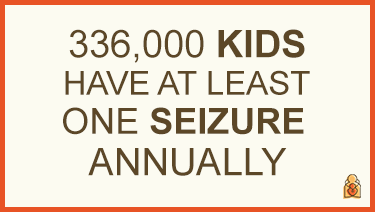By: Susan Matesanz, MD & Marissa Di Giovine, MD, FAAP
About 1 out of 10 people may have a seizure during their lifetime.
If you saw your child―or any child― having a seizure would you know how to help?
Seizures can be alarming. They are caused by surges in the brain's electrical activity and can cause a child to fall down and shake or twitch violently. Or, a child may suddenly become unresponsive during a trance-like staring spell.
While this all sounds scary, keep in mind that seizures in children usually are not medical
emergencies; the majority of seizures in children will end on their own within five minutes.
 Here are some first aid reminders in case your child or a child in your care ever have a seizure:
Here are some first aid reminders in case your child or a child in your care ever have a seizure:
When should I call 911 for a child's seizure?
If this is your child's first seizure
If the seizure lasts more than 5 minutes
If your child is having back-to-back seizures and not returning to normal in between
If your child is not waking up after the seizure
If your child was injured during the seizure
If your child has any trouble breathing
If your child's seizure happens in the water
If your child has diabetes or other life-threatening medical conditions
Follow up with your child's doctor after any type of seizure.
Children should always be seen by their doctor to determine what caused the seizure—high fever, for example, or other medical problems or neurological conditions such as
epilepsy. Your doctor can help you treat any underlying causes identified. They can also help create a "seizure action plan" in case your child ever has any more seizures.
More information
About Dr. Matesanz
 Susan Matesanz, MD, is a pediatric neurologist currently in her final year of residency at the Children's Hospital of Philadelphia. Next year, she will be completing a fellowship in neuromuscular medicine at the Children's Hospital of Philadelphia. She is a member of the American Academy of Pediatrics Section on Neurology.
Susan Matesanz, MD, is a pediatric neurologist currently in her final year of residency at the Children's Hospital of Philadelphia. Next year, she will be completing a fellowship in neuromuscular medicine at the Children's Hospital of Philadelphia. She is a member of the American Academy of Pediatrics Section on Neurology.
About Dr. Giovine
 Marissa Di Giovine, MD, FAAP, is a Pediatric Neurologist who subspecializes in epilepsy. She currently holds the position of Assistant Professor of Clinical Neurology at the University of Pennsylvania's Perelman School of Medicine and is an active member of the Pediatric Regional Epilepsy Program at the Children's Hospital of Philadelphia. She is also proud to be a founding member of the American Academy of Pediatrics' Committee on Mentorship, and an active member of the American Academy of Pediatrics, especially within the Section on Early Career Physicians and Section on Neurology.
Marissa Di Giovine, MD, FAAP, is a Pediatric Neurologist who subspecializes in epilepsy. She currently holds the position of Assistant Professor of Clinical Neurology at the University of Pennsylvania's Perelman School of Medicine and is an active member of the Pediatric Regional Epilepsy Program at the Children's Hospital of Philadelphia. She is also proud to be a founding member of the American Academy of Pediatrics' Committee on Mentorship, and an active member of the American Academy of Pediatrics, especially within the Section on Early Career Physicians and Section on Neurology.